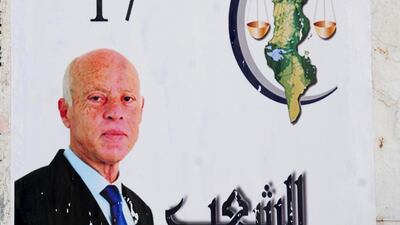Early results from the first round of Tunisia’s presidential election showed that voters had rejected a political establishment that failed to deliver the promised benefits of the 2011 uprising.
Exit polls showed political outsiders Kais Saied, a law professor and political commentator, and jailed media magnate Nabil Karoui were leading the other 24 names on the ballot with nearly half of the votes counted.
Mr Saied was on 18.8 per cent and Mr Karoui on 15.4 per cent, with Abdelfattah Mourou, of the moderate Islamist Ennahda party, in third place holding 13.2 per cent of votes cast.
Support for Mr Saied and Mr Karoui, and the low election turnout of just 45 per cent compared with 63 per cent in 2014, reflect simmering anger at politicians who engaged in public bickering while the economy sank and unemployment rose.
Voters punished some of the biggest names in Tunisian politics. Mr Mourou managed only third place despite the backing of one of the largest, most sophisticated party machines in the region.
Defence Minister Abdelkarim Zbidi, portrayed by supporters as heir apparent to former president Beji Caid Essebsi and Prime Minister Youssef Chahed, failed to gain any significant support.
“People are disappointed by the old system that has been ruling for years, so people voted for Saied and Karoui because they don’t belong to the old parties,” said Meriam Yahiaoui, a student in Tunis.
The uprising that deposed Zine El Abidine Ben Ali has done little to reduce poverty in Tunisia’s neglected interior, while life in poor districts of the capital and coastal cities is no better than eight years ago.
The revolution’s promise of “work, freedom and dignity” remains only partly fulfilled and, in some quarters, mostly forgotten.
Unemployment has risen from a little over 13 per cent in 2010 to more than 15 per cent.
Corruption, once personified by Mr Ben Ali and his extended family, is rampant among the new regime of plutocrats and civil servants.
The institutions promised in the country’s 2014 constitution, such as a constitutional court, have not been realised.
With every year that passes, the cost of living rises while the Tunisian dinar continues to falter.
Chamkhi El Weti, 30, a shopkeeper in the capital Tunis, said he did not vote on Sunday but might support Mr Saied in the second round.
“People no longer trust parties, that’s why they opted for Saied and Karoui,” Mr El Weti said.
He was not concerned by the front-runners’ lack of political experience, saying the freedom to make wrong decisions was a healthy part of any democracy.
For many observers, Mr Karoui’s arrest at the start of the campaign in late August underscored the perception of an establishment unwilling to be held to account.
The owner of the Nessma TV station, which publicised his philanthropic acts, enjoyed the most public support, polls this year showed.
Mr Karoui's supporters claim his detention on charges of tax evasion and money laundering from 2016 was part of a campaign that included having his offices raided in May and a proposed election law that seemed to be designed to stop him running.
Tunisia’s election commission said the final result would be declared today. Time will then be allowed for legal objections to the first-round result.
The two leading candidates will then contest a run-off vote that could be held either on September 29 or October 6, alongside elections to Tunisia’s Parliament, or October 13, election commission vice president Farouk Bouaskar said.













